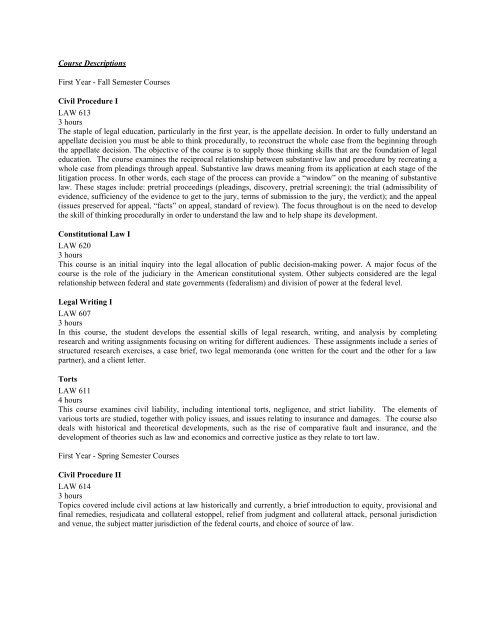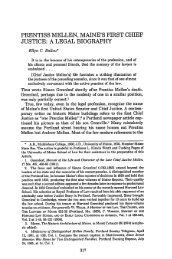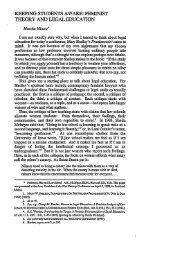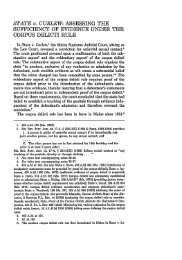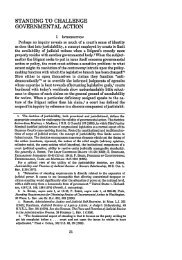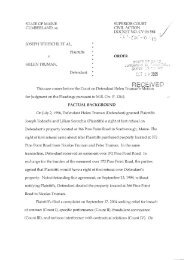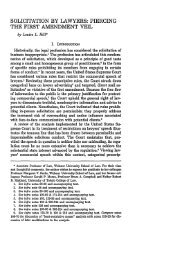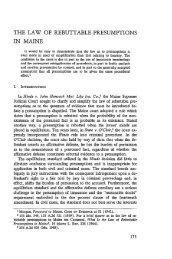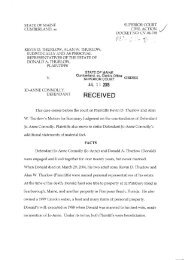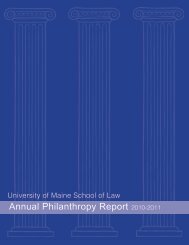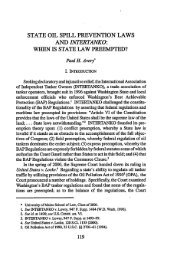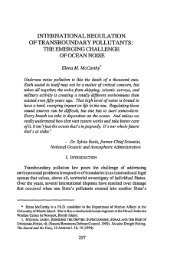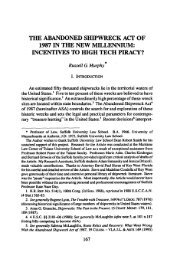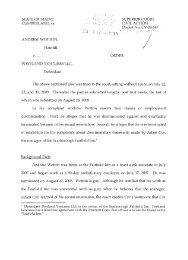PDF of Course Descriptions - University of Maine School of Law
PDF of Course Descriptions - University of Maine School of Law
PDF of Course Descriptions - University of Maine School of Law
Create successful ePaper yourself
Turn your PDF publications into a flip-book with our unique Google optimized e-Paper software.
<strong>Course</strong> <strong>Descriptions</strong><br />
First Year - Fall Semester <strong>Course</strong>s<br />
Civil Procedure I<br />
LAW 613<br />
3 hours<br />
The staple <strong>of</strong> legal education, particularly in the first year, is the appellate decision. In order to fully understand an<br />
appellate decision you must be able to think procedurally, to reconstruct the whole case from the beginning through<br />
the appellate decision. The objective <strong>of</strong> the course is to supply those thinking skills that are the foundation <strong>of</strong> legal<br />
education. The course examines the reciprocal relationship between substantive law and procedure by recreating a<br />
whole case from pleadings through appeal. Substantive law draws meaning from its application at each stage <strong>of</strong> the<br />
litigation process. In other words, each stage <strong>of</strong> the process can provide a “window” on the meaning <strong>of</strong> substantive<br />
law. These stages include: pretrial proceedings (pleadings, discovery, pretrial screening); the trial (admissibility <strong>of</strong><br />
evidence, sufficiency <strong>of</strong> the evidence to get to the jury, terms <strong>of</strong> submission to the jury, the verdict); and the appeal<br />
(issues preserved for appeal, “facts” on appeal, standard <strong>of</strong> review). The focus throughout is on the need to develop<br />
the skill <strong>of</strong> thinking procedurally in order to understand the law and to help shape its development.<br />
Constitutional <strong>Law</strong> I<br />
LAW 620<br />
3 hours<br />
This course is an initial inquiry into the legal allocation <strong>of</strong> public decision-making power. A major focus <strong>of</strong> the<br />
course is the role <strong>of</strong> the judiciary in the American constitutional system. Other subjects considered are the legal<br />
relationship between federal and state governments (federalism) and division <strong>of</strong> power at the federal level.<br />
Legal Writing I<br />
LAW 607<br />
3 hours<br />
In this course, the student develops the essential skills <strong>of</strong> legal research, writing, and analysis by completing<br />
research and writing assignments focusing on writing for different audiences. These assignments include a series <strong>of</strong><br />
structured research exercises, a case brief, two legal memoranda (one written for the court and the other for a law<br />
partner), and a client letter.<br />
Torts<br />
LAW 611<br />
4 hours<br />
This course examines civil liability, including intentional torts, negligence, and strict liability. The elements <strong>of</strong><br />
various torts are studied, together with policy issues, and issues relating to insurance and damages. The course also<br />
deals with historical and theoretical developments, such as the rise <strong>of</strong> comparative fault and insurance, and the<br />
development <strong>of</strong> theories such as law and economics and corrective justice as they relate to tort law.<br />
First Year - Spring Semester <strong>Course</strong>s<br />
Civil Procedure II<br />
LAW 614<br />
3 hours<br />
Topics covered include civil actions at law historically and currently, a brief introduction to equity, provisional and<br />
final remedies, resjudicata and collateral estoppel, relief from judgment and collateral attack, personal jurisdiction<br />
and venue, the subject matter jurisdiction <strong>of</strong> the federal courts, and choice <strong>of</strong> source <strong>of</strong> law.
Criminal <strong>Law</strong><br />
LAW 605<br />
3 hours<br />
This course inquires into the meaning <strong>of</strong> substantive criminal law by examining how criminal law doctrine functions<br />
in the criminal process and what purposes it serves. The course examines how lawyers identify how each alternative<br />
meaning would work in the adjudication process and what purposes would be served by each alternative. The course<br />
focuses on the structure <strong>of</strong> criminal law: legislative definition <strong>of</strong> the elements <strong>of</strong> crimes and defenses to crime;<br />
adjudication by courts <strong>of</strong> guilt or innocence; and regulation <strong>of</strong> sentencing by legislatures and courts. The course<br />
examines how lawyers discover the meaning <strong>of</strong> criminal law doctrines, even as they help shape the meaning <strong>of</strong> those<br />
doctrines.<br />
Legal Writing II<br />
LAW 608<br />
3 hours<br />
This course requires the student to integrate and apply the legal research, analysis, and writing skills developed in<br />
Legal Writing I, the previous semester. In a moot court exercise, the student assumes the role <strong>of</strong> an advocate, who<br />
writes an appellate brief in an actual United States Supreme Court case and argues it orally before a panel <strong>of</strong> judges<br />
drawn from the <strong>Maine</strong> bench and bar, and the <strong>Law</strong> <strong>School</strong> faculty.<br />
Property<br />
LAW 610<br />
4 hours<br />
The arrangements under Anglo-American law for the ownership and control <strong>of</strong> the use <strong>of</strong> property are examined in a<br />
way designed to develop lawyers' skills for practice in this area <strong>of</strong> the law and to improve understanding <strong>of</strong> the<br />
concepts and operation <strong>of</strong> property law as a social institution. Aspects <strong>of</strong> property law which are covered include the<br />
meaning and implications <strong>of</strong> property law, legal concepts <strong>of</strong> land ownership (estates and future interests), public<br />
rights to take or control the use <strong>of</strong> privately held land, private devices to control the use <strong>of</strong> land owned by others,<br />
and the relationship between landlord and tenant.<br />
Full Year <strong>Course</strong> - Contracts I & II<br />
LAW 603, 604<br />
3 hours each semester<br />
This course provides an introduction to the enforcement <strong>of</strong> promises at law and the nature <strong>of</strong> the protection given.<br />
The evolution <strong>of</strong> common-law theory in support <strong>of</strong> the agreement process is explored along with the specialized<br />
doctrinal areas which will make up the modern law <strong>of</strong> contract. The focus <strong>of</strong> the second semester will be contracts<br />
for the sale <strong>of</strong> goods under Article II <strong>of</strong> the Uniform Commercial Code and the provisions <strong>of</strong> the UN Convention<br />
dealing with international sales.<br />
Second & Third Year <strong>Course</strong>s<br />
Accounting for <strong>Law</strong>yers<br />
LAW 710<br />
2 hours<br />
The course will provide an introduction to accounting concepts and financial reporting fundamentals. Topics will<br />
include generally accepted accounting principles and the basics <strong>of</strong> financial statements (the balance sheet, the<br />
income statement and the statement <strong>of</strong> cash flows). Students will be taught how to critically analyze financial data<br />
and make important observations about accountants' reports, financial statements and financial statement footnote<br />
disclosures. Students may also develop skills in applying financial language in drafting agreements and in properly<br />
examining an expert witness on damages and other matters.
Administrative <strong>Law</strong><br />
LAW 621<br />
3 hours<br />
This course examines the procedural laws that regulate the activities <strong>of</strong> administrative agencies. Students will<br />
examine the reasons for administrative governance, the tasks handled by administrative agencies, and the roles <strong>of</strong><br />
lawyers working with and against administrative agencies. Students also will consider the relationships among<br />
administrative agencies, the elected branches, and the judiciary.<br />
Admiralty<br />
LAW 624<br />
3 hours<br />
This course is an introduction to the basic principles <strong>of</strong> admiralty jurisdiction and practice. Topics may include<br />
choice <strong>of</strong> law, contract, maritime liens and ship mortgages, chartering, pilotage, oceans bills <strong>of</strong> lading, seamen's<br />
rights, personal injury, wrongful death, collision, salvage, carriage <strong>of</strong> goods, general average, marine insurance and<br />
ship-owner liability.<br />
Advanced Appellate Advocacy II<br />
LAW 640<br />
3 hours<br />
This course is a continuation <strong>of</strong> Appellate Advocacy and is open only to members <strong>of</strong> the Mood Court Board who<br />
qualified for that course. In Advanced Appellate Advocacy, each member <strong>of</strong> the Board participates, in either the<br />
firth or sixth semester, in a moot court competition against teams from other law schools.<br />
Advanced Business Associations<br />
LAW 668<br />
3 hours<br />
This course will examine selected topics in securities and corporation finance law. The content <strong>of</strong> the course may<br />
vary from year to year depending on the instructor, and the matters previously covered in Business Associations.<br />
However, the core curriculum will include the concept <strong>of</strong> "legal capital" and the issues arising in connection with the<br />
issuance <strong>of</strong> stock, dividends and distributions, and a corporation's repurchase <strong>of</strong> its shares; valuation <strong>of</strong> a corporate<br />
enterprise; the rights and remedies <strong>of</strong> preferred shareholders, bond holders and others who hold debt or convertible<br />
securities; mergers, acquisitions and other fundamental transactions; the securities regulation process and the<br />
exemptions therefrom; and the rights and liabilities <strong>of</strong> purchasers and sellers <strong>of</strong> securities.<br />
Advanced Land Use <strong>Law</strong><br />
LAW 635<br />
3 hours<br />
This course examines a range <strong>of</strong> land use problems that demand some type <strong>of</strong> regulatory (police power) response:<br />
rapid growth, growth in fragile land areas, locating difficult to locate but essential land use activities, providing<br />
affordable housing. Tensions between federal, state, and local governments in the land use decision making process<br />
will be examined, as well as a range <strong>of</strong> sophisticated land use control strategies, i.e. transferable development rights,<br />
contract zoning, planned unit development, carrying capacity zoning.<br />
Advanced Legal Research<br />
LAW 731<br />
2 hours
Advanced Legal Writing<br />
LAW 686<br />
3 hours<br />
Advanced topics at instructor’s election. The focus <strong>of</strong> the course may be on legal scholarship, writing appellate<br />
briefs, transactional drafting, or other forms <strong>of</strong> legal writing. This course is limited to ten students.<br />
Advanced Topics in Property Theory<br />
<strong>Law</strong> 711<br />
2 hours<br />
The conception <strong>of</strong> property as that which describes the individual's inviolable sphere has been central to our<br />
constitutional scheme and to calls for protection <strong>of</strong> various interests by the political right and the political left. In<br />
this seminar, we will examine the concept <strong>of</strong> property, its place in liberal democratic theory, and its usefulness in<br />
resolving issues <strong>of</strong> current social conflict. We will begin with a general consideration <strong>of</strong> the concept <strong>of</strong> rights, by<br />
examining some philosophical readings on rights theories and critiques <strong>of</strong> those theories. We will then look at the<br />
particular right <strong>of</strong> property: what it is, and the extent to which it should be placed beyond the democratic process<br />
through various constitutional theories <strong>of</strong> protection. We will also consider the extent to which property concepts<br />
can be usefully employed to resolve an array <strong>of</strong> current social issues, such as the enforcement <strong>of</strong> surrogacy<br />
(parental) contracts, the sale or other control <strong>of</strong> body parts, the fate <strong>of</strong> human embryos, the distribution <strong>of</strong> human<br />
organs for transplantation or other uses, the pursuit <strong>of</strong> human cloning and genetic engineering, an individual's<br />
control <strong>of</strong> personal information, and others. There will be no examination in this course. Evaluation will be based<br />
on brief reaction papers written in response to readings, and class participation.<br />
Advanced Torts<br />
LAW 677<br />
3 hours<br />
This course will complete the introduction to the basic fields <strong>of</strong> Tort <strong>Law</strong> begun by the first-year Torts class. Among<br />
the topics receiving thorough examination are products liability, defamation and privacy, pr<strong>of</strong>essional negligence,<br />
misrepresentation and other commercial torts and government <strong>of</strong>ficer liability. The coverage will also allow<br />
examination <strong>of</strong> the significance <strong>of</strong> economics in tort law and the politics <strong>of</strong> contemporary tort reform. At the<br />
conclusion <strong>of</strong> the course, the student should be prepared for tort questions on a Bar Examination and have a comfort<br />
level to begin work in a tort law practice situation.<br />
Advanced Trial Practice<br />
LAW 638<br />
2 or 3 hours<br />
This is an advanced trial advocacy course, covering advanced trial practice skills at the instructor’s election.<br />
Alternative Dispute Resolution<br />
LAW 684<br />
3 hours<br />
This course considers alternative dispute resolution (ADR) as an important tool for the resolution <strong>of</strong> civil actions, as<br />
well as disputes outside the judicial arena. ADR processes, including negotiation, mediation, arbitration, early<br />
neutral evaluation and hybrid processes, will be examined in both a theoretical and a practical context, with<br />
emphasis on effective<br />
advocacy in ADR.<br />
American Indian <strong>Law</strong><br />
LAW 600<br />
2 hours<br />
The emphasis <strong>of</strong> this seminar will be on the body <strong>of</strong> federal law that defines the relationship between Native<br />
Americans and the federal and state governments.
Antitrust <strong>Law</strong><br />
LAW 626<br />
3 hours<br />
This course examines the control <strong>of</strong> private economic power through government enforcement and private damage<br />
suits under the Sherman and Clayton Acts. It also explores regulation <strong>of</strong> competition by the European Commission.<br />
The topics considered include legal and economic concepts <strong>of</strong> monopoly power and monopolization; collaboration<br />
among competitors to restrain trade by fixing prices, by allocating territories or customers or by other similar<br />
conduct; vertical relationships between firms at different levels <strong>of</strong> production that may operate to restrain trade; and<br />
horizontal, vertical and conglomerate mergers. Students will need a familiarity with some basic concepts <strong>of</strong><br />
economics.<br />
Appellate Advocacy<br />
LAW 639<br />
2 hours<br />
This course is <strong>of</strong>fered in the student’s fourth semester and is open only to members <strong>of</strong> the Moot Court Board, who<br />
are chosen through an open competition at the beginning <strong>of</strong> the third semester. During the fourth semester, the<br />
twelve members <strong>of</strong> the Board write a brief on the case that is the subject <strong>of</strong> the first-year writing requirement, and<br />
then assist the first year students in preparing their formal oral arguments.<br />
Banking <strong>Law</strong><br />
LAW 702<br />
3 hours<br />
The course is a study <strong>of</strong> the development <strong>of</strong> banking activities, structure, and regulation. It explores state and federal<br />
statutory and regulatory law governing commercial banks and to a lesser extent savings and loan associations,<br />
savings banks, and credit unions. The assigned materials will present students with an opportunity to draw upon,<br />
integrate, and apply corporate, commercial and regulatory law. Problem situations to be presented include: control<br />
<strong>of</strong> the money supply and Federal Reserve membership, banking powers, trust department activities, bank holding<br />
company activities, bank antitrust problems, formation and failure <strong>of</strong> banks, commercial paper activities, electronic<br />
fund transfers, and United States control <strong>of</strong> international banking.<br />
Bankruptcy<br />
LAW 625<br />
3 hours<br />
This course will focus on federal bankruptcy law and practice. Coverage will include both consumer bankruptcy and<br />
business bankruptcy issues. Secured Transactions (<strong>Law</strong> 629) is a prerequisite.<br />
Business Associations<br />
LAW 601<br />
3 or 4 hours<br />
This course reviews principles <strong>of</strong> agency and the essentials <strong>of</strong> partnership, limited partnership, and the limited<br />
liability company. The primary focus <strong>of</strong> the course is the legal framework for the governance <strong>of</strong> the modern<br />
corporation. Topics considered include choice <strong>of</strong> organization, distribution <strong>of</strong> powers, fiduciary relationships,<br />
questions <strong>of</strong> corporate governance, the special problems <strong>of</strong> closely held corporations, the regulation <strong>of</strong> securities<br />
transactions, and mergers, acquisitions and takeovers.<br />
Business <strong>Law</strong> Seminar<br />
LAW 669<br />
2 hours<br />
This seminar considers advanced topics related to business law at the instructor's election.
Business Planning<br />
LAW 662<br />
3 hours<br />
This course is an advanced study <strong>of</strong> selected legal problems relating to business organization and finance. Through<br />
an examination <strong>of</strong> several extensive problems involving business transactions, students will have an opportunity to<br />
combine work in business associations, federal taxation, corporate finance and securities regulation in the context <strong>of</strong><br />
business planning and counseling. Special attention will be devoted to planning for closely held enterprises.<br />
Individual grades may be based on: performance in leading class discussion on various aspects <strong>of</strong> the assigned<br />
problems; written business plans directed to the resolution <strong>of</strong> the planning problems; and class participation during<br />
presentations <strong>of</strong> other class members. Enrollment is limited to twelve students. Business Associations (<strong>Law</strong> 601),<br />
Taxation I (<strong>Law</strong> 649) and Taxation II (<strong>Law</strong> 654) are prerequisites. Advanced Business Associations (<strong>Law</strong> 668) is a<br />
pre- or co-requisite.<br />
Canadian Legal System<br />
LAW 676<br />
3 hours<br />
This course will first survey the constitutional history <strong>of</strong> Canada, including an examination <strong>of</strong> the development <strong>of</strong><br />
the legal institutions <strong>of</strong> the province <strong>of</strong> Quebec. Next, the course will compare the operation <strong>of</strong> the parliamentary<br />
system <strong>of</strong> government in Canada with the American separation <strong>of</strong> powers system. Finally, there will be a<br />
consideration <strong>of</strong> selected decisions <strong>of</strong> the Supreme Court <strong>of</strong> Canada, with regard to questions <strong>of</strong> federalism and<br />
individual rights and a comparison <strong>of</strong> the results in those cases with the American experience.<br />
Children and the <strong>Law</strong><br />
LAW 708<br />
3 hours<br />
This course will focus on the broader topic "Children and the <strong>Law</strong>," with special emphasis on the juvenile justice<br />
system. Central to course discussions will be how the law allocates power and responsibilities for children and how<br />
it should do so. Other core issues that this course will explore include the appropriate role <strong>of</strong> government vis-a-vis<br />
children and their families, children and the criminal justice system, and the conflict between children's<br />
constitutional rights and parental prerogatives.<br />
Coastal Zone <strong>Law</strong><br />
LAW 687<br />
3 hours<br />
The course explores legal issues arising from the use and protection <strong>of</strong> the lands, waters, and natural resources <strong>of</strong> the<br />
coastline, coastal watersheds, and the near shore marine environment. Topics studied include laws and policies<br />
defining public and private property rights in the shoreline and submerged lands, coastal wetlands protection, coastal<br />
erosion, public shoreline access, disaster preparedness and climate change, and other coastal resources and uses.<br />
Commercial <strong>Law</strong> Seminar<br />
LAW 634<br />
2 or 3 hours<br />
Advanced topics related to commercial law, at the instructor’s election.<br />
Comparative <strong>Law</strong><br />
LAW 646<br />
3 hours<br />
A comparative study <strong>of</strong> common law and civil law legal systems, including the development and influence <strong>of</strong> the<br />
European Civil codes, the role <strong>of</strong> the judiciary in the common law and civil law systems, and the development <strong>of</strong><br />
democratic institutions under different models <strong>of</strong> constitutionalism.
Conflict <strong>of</strong> <strong>Law</strong>s<br />
LAW 642<br />
3 hours<br />
The course examines the principles used by the courts in choosing the law applicable to events and transactions<br />
having contacts with more than one jurisdiction. It examines also the reach <strong>of</strong> a jurisdiction's domestic law, rules for<br />
the recognition and enforcement <strong>of</strong> foreign judgments, and limits on jurisdiction to adjudicate in both interstate and<br />
international settings. Methods <strong>of</strong> harmonizing differing rules and policies in multi-jurisdictional transactions are<br />
considered.<br />
Constitutional <strong>Law</strong> II<br />
LAW 641<br />
3 hours<br />
This required course will explore the concepts <strong>of</strong> constitutional civil liberties and minority rights as part <strong>of</strong> the basic<br />
institutional framework <strong>of</strong> our legal system. Coverage will include the nature and development <strong>of</strong> the rights<br />
specified in the first amendment; rights under the due process, and equal protection clauses <strong>of</strong> the fourteenth<br />
amendment.<br />
Constitutional <strong>Law</strong> Seminar<br />
LAW 636<br />
2 or 3 hours<br />
Advanced topics related to constitutional law, at the instructor’s election.<br />
Consumer <strong>Law</strong> Seminar<br />
LAW 609<br />
2 or 3 hours<br />
This course examines the case law, statutes and regulations that affect consumer transactions. Selected topics at the<br />
instructor’s election.<br />
Copyright <strong>Law</strong><br />
LAW 703<br />
3 hours<br />
This course examines the nature <strong>of</strong> the rights protected under federal copyright law and the types <strong>of</strong> works that<br />
qualify for protection, including literary, artistic, and musical works. This course also covers copyright duration,<br />
ownership, formalities, remedies for infringement, and principles <strong>of</strong> international protection. The Copyright Act <strong>of</strong><br />
1976 as amended forms the core statutory material covered by the course. The final grade is based upon class<br />
participation, a paper and an in-class presentation.<br />
Criminal <strong>Law</strong> Seminar<br />
LAW 679<br />
2 hours<br />
Selected topics at instructor’s discretion<br />
Criminal Procedure: Adjudication<br />
LAW 606<br />
3 hours<br />
At the heart <strong>of</strong> the criminal process is discretionary decision-making by prosecutors and defense counsel. The<br />
prosecutor has vast, unreviewable power over the charging decision. But with that power comes the responsibility to<br />
evaluate the truthfulness <strong>of</strong> potential testimony by cooperating witnesses, police <strong>of</strong>ficers, law enforcement experts<br />
and alleged victims. <strong>Law</strong> by agreement <strong>of</strong> the prosecutor and defense counsel is the “law” that settles more than 90<br />
percent <strong>of</strong> criminal cases, and the most important advocacy <strong>of</strong> defense counsel is <strong>of</strong>ten directed to the prosecutor.<br />
Before plea bargaining, the lawyers must evaluate everything that has gone before, such as the results <strong>of</strong> formal and<br />
informal discovery, the amount <strong>of</strong> time served pending trial, and the likelihood <strong>of</strong> conviction and <strong>of</strong> a particular
sentence. Mutual trust between prosecutors and defense counsel, or its lack, significantly influences the functioning<br />
<strong>of</strong> the criminal process. Having identified the powers <strong>of</strong> prosecutors and defense counsel, the course attempts an<br />
extended inquiry onto how these powers should be exercised.<br />
Criminal Procedure: Investigation<br />
LAW 693<br />
3 hours<br />
This course will focus on the investigative phase <strong>of</strong> criminal proceedings. We will examine the law that governs<br />
police conduct, including search and seizure, arrest and interrogation <strong>of</strong> suspects. The class will emphasize the<br />
interplay between abstract constitutional principles as interpreted by the courts and law enforcement on the street.<br />
Disability <strong>Law</strong> Seminar<br />
LAW 745<br />
2 or 3 hours<br />
This seminar considers advanced topics related to disability law at the instructor's election.<br />
Economic Regulation <strong>of</strong> Business<br />
LAW 666<br />
3 hours<br />
This course examines government economic regulation in a number <strong>of</strong> different contexts. There is a specific<br />
emphasis on economic analysis and economic justifications for regulation. The history and development <strong>of</strong><br />
constitutional limitations on the regulation <strong>of</strong> business by government will be reviewed. The primary focus <strong>of</strong> the<br />
course is on traditional public utility regulation and the current efforts to deregulate certain <strong>of</strong> these public utilities,<br />
especially local telephone service and electricity generation. Timing permitting, government regulation in selected<br />
other sectors <strong>of</strong> the economy, e.g., health care and banking, will be examined and critiqued. The impact <strong>of</strong><br />
government regulation on industrial concentration and on technological innovation will also be considered.<br />
Education <strong>Law</strong><br />
LAW 682<br />
3 hours<br />
This course blends constitutional law, case law, and state and federal statutory analysis. The course will focus on<br />
current issues in public education, such as compulsory attendance, religion in the schools, curriculum control,<br />
students' rights, rights <strong>of</strong> the disabled, desegregation, and teacher employment.<br />
Elder <strong>Law</strong><br />
LAW 705<br />
3 hours<br />
Elder <strong>Law</strong> explores the impact <strong>of</strong> an aging society on law and social policy. Topics include legal ethics, income<br />
maintenance and age discrimination, health care finance and delivery, long-term care entities and regulations,<br />
guardianship, and issues in retirement planning. Typically, students have an opportunity to write short papers on<br />
current topics <strong>of</strong> their choosing. Excellent papers may be accepted for publication in Elder’s Advisor: Journal <strong>of</strong><br />
Elder <strong>Law</strong> and Post Retirement<br />
Planning.<br />
Employment Discrimination <strong>Law</strong><br />
LAW 653<br />
3 hours<br />
This course covers the legal bases for prohibiting discrimination in employment. Focus is on federal and state antidiscrimination<br />
statutes, including Title VII, the Age Discrimination in Employment Act, the Americans with<br />
Disabilities Act, the Civil Rights Act <strong>of</strong> 1991, the Reconstruction Era Civil Rights Act, the Immigration Reform and<br />
Control Act, the Equal Pay Act, the <strong>Maine</strong> Human Rights and Whistleblower Protection Act. The four major<br />
categories <strong>of</strong> discriminatory treatment are explored, including the type <strong>of</strong> evidence, burden <strong>of</strong> pro<strong>of</strong>, defenses, and<br />
litigation strategy applicable to each. Administrative procedures specific to employment discrimination claims are
also covered. In addition to substantive law, this course emphasizes practical considerations for advising and<br />
representing clients in employment disputes.<br />
Environmental <strong>Law</strong><br />
LAW 637<br />
3 hours<br />
This course explores the causes <strong>of</strong> environmental degradation, the alternative legal regimes available to prevent or<br />
ameliorate it, and the role <strong>of</strong> the Congress, the courts, the agencies and the states in these regimes. The course<br />
focuses primarily upon pollution control statutes, but also includes discussion <strong>of</strong> intersections <strong>of</strong> environmental law<br />
and tort, administrative, and constitutional law.<br />
Environmental <strong>Law</strong> Seminar<br />
LAW 612<br />
2, 3 hours<br />
This seminar considers advanced topics in Environmental <strong>Law</strong>, at the election <strong>of</strong> the instructor.<br />
Environmental Torts and Toxics Regulation<br />
LAW 617<br />
3 hours<br />
This course is a study <strong>of</strong> the statutory, common law and constitutional principles governing regulation <strong>of</strong> toxic<br />
substances and the environment. Topics studied include community and workplace chemical "right to know" laws,<br />
pollution prevention, regulation and clean-up <strong>of</strong> solid, hazardous and radioactive waste, toxic torts, and pesticides.<br />
The course will review federal and <strong>Maine</strong> law, and will explore the constitutional issues <strong>of</strong> preemption and<br />
commerce clause restrictions which frequently come into play when states and municipal governments seek to<br />
regulate this area. Students will also have an opportunity to explore practical problems <strong>of</strong> toxics litigation, including<br />
use <strong>of</strong> experts and technical data, and the selection <strong>of</strong> appropriate remedies and issues for litigation.<br />
Estate & Gift Taxation<br />
LAW 678<br />
3 hours<br />
The course covers federal taxation <strong>of</strong> life and death transfers, including gifts, various types <strong>of</strong> trusts, property in<br />
which decedent has an interest at death; effects <strong>of</strong> retained powers and interests; the system <strong>of</strong> deductions and<br />
credits allowable to gifts and estates; taxes on generation-skipping transfers; limited consideration, if time allows, <strong>of</strong><br />
estate and related income tax planning issues. Taxation I (<strong>Law</strong> 649) is a prerequisite except by permission <strong>of</strong> the<br />
instructor. Trusts and Estates is a co-or prerequisite.<br />
Estate Planning<br />
LAW 643<br />
3 hours<br />
The course is an examination <strong>of</strong> problems arising in the inter vivos and testamentary disposition <strong>of</strong> estates, including<br />
the tax problems <strong>of</strong> such disposition, the use <strong>of</strong> the trust and other methods for disposition <strong>of</strong> estates, and problems<br />
<strong>of</strong> drafting. The course emphasizes a problem oriented approach. Trusts and Estates (<strong>Law</strong> 695), Estate and Gift<br />
Taxation (<strong>Law</strong> 678), and Taxation I (<strong>Law</strong> 649) are prerequisites, except by permission <strong>of</strong> the instructor.<br />
European Union <strong>Law</strong><br />
LAW 657<br />
3 hours<br />
In studying the law <strong>of</strong> the European Community, students will gain an insight into the building and operation <strong>of</strong> a<br />
federal-type regulatory and (perhaps) governmental structure. Comparisons with the American system are readily<br />
apparent and will lead to deeper understanding <strong>of</strong> the nature <strong>of</strong> federalism. Many <strong>of</strong> the specific problems <strong>of</strong><br />
American federalism are replicated in the European context. Also, the subject has direct practical application in the<br />
context <strong>of</strong> international business, as for the most part European Community law serves economic ends.
Evidence<br />
LAW 644<br />
3 hours<br />
This course provides a working knowledge <strong>of</strong> the Federal Rules <strong>of</strong> Evidence. Students are introduced to the major<br />
issues in the law <strong>of</strong> evidence including: the functions <strong>of</strong> judge, counsel, witness and juror, relevance and its<br />
limitations, impeachment <strong>of</strong> witnesses, and constitutional limitations upon evidentiary rules. The course uses a<br />
problem-solving approach emphasizing the application <strong>of</strong> evidentiary rules and principles in the context <strong>of</strong> trials to a<br />
jury. This course is a co-or prerequisite for Trial Practice (<strong>Law</strong> 650); and a prerequisite for all clinical <strong>of</strong>ferings.<br />
Externship<br />
LAW 690<br />
6 hours<br />
Externships <strong>of</strong>fer third-year and some second-year students the opportunity to gain legal experience and receive<br />
feedback on their work from seasoned pr<strong>of</strong>essionals with guidance and support from a faculty member. Externs<br />
work at their placements approximately 18 hours per week over the course <strong>of</strong> the semester. Students are selected for<br />
participation based on application materials (resume, transcript, cover letter and writing sample). A conflict <strong>of</strong><br />
interest form must be submitted at the time <strong>of</strong> application.<br />
Family <strong>Law</strong><br />
LAW 673<br />
3 hours<br />
This course focuses upon basic legal issues relating to marriage, family and the termination <strong>of</strong> marriage. One<br />
segment <strong>of</strong> the course emphasizes jurisprudential and constitutional issues underpinning the institutions <strong>of</strong> marriage<br />
and family. A second segment emphasizes major doctrinal developments, including the laws <strong>of</strong> marital property,<br />
support and child custody.<br />
Federal Courts<br />
LAW 645<br />
3 hours<br />
The course addresses the most important, interesting and controversial functions <strong>of</strong> the federal courts: Federal court<br />
enforcement <strong>of</strong> federal constitutional law limiting state action. It focuses on the need to see federal constitutional<br />
rights and their enforcement system <strong>of</strong> jurisdiction and remedies as an integrated whole, in historical context. The<br />
course is approached as a system <strong>of</strong> relationships. There is a set <strong>of</strong> relationships between federal courts and state<br />
courts; sometimes federal courts review judgments <strong>of</strong> state courts, sometimes there is a jostling among the courts for<br />
the exercise <strong>of</strong> initial jurisdiction. There is a set <strong>of</strong> relationships between federal courts and state governments and<br />
<strong>of</strong>ficers, raising questions <strong>of</strong> who are proper parties and what are proper remedies. The policies which underlie not<br />
only the enforcement system but the rights themselves travel under the code word “federalism”. Federalism is all<br />
about balance. It is about balancing the need for federal court enforcement <strong>of</strong> federal constitutional rights with the<br />
need not to unduly interfere with legitimate state interests. The course will inquire into the meanings <strong>of</strong> “federalism”<br />
in its jurisdictional, remedial and historical contexts. Our tour through over two centuries <strong>of</strong> federal jurisdiction,<br />
rights and remedies law hopefully will engender a deep understanding and appreciation <strong>of</strong> the marvelous uniqueness<br />
and resilience <strong>of</strong> our federal system.<br />
General Practice Clinic<br />
LAW 663<br />
6 hours<br />
This course is designed for students who want to have the broadest possible clinical experience. Each student is<br />
admitted to practice in <strong>Maine</strong> courts as a “student attorney,” and will maintain an active case load <strong>of</strong> four to eight<br />
cases, which may include general civil, family, probate, appellate, or criminal cases. The course is practice- and<br />
skill-oriented, covering client counseling, ethics, investigation, pre-trial practice, negotiation, document drafting,<br />
trial experience, and appeals. You will learn how to be a lawyer, and how to interact with other lawyers, the courts<br />
and clients. Students will work with the close supervision and mentoring <strong>of</strong> a faculty supervisor. Along with<br />
regular work on cases, students also participate in a weekly one-hour seminar to discuss ongoing cases, ethical<br />
issues, lawyering skills and other topics. Enrollment is limited to twelve (12) to fifteen (15) third-year students, at
the instructors' election. Evidence (LAW 644), Trial Practice (LAW 650), and Pr<strong>of</strong>essional Responsibility (LAW<br />
632) are pre-requisites.<br />
Group Study<br />
LAW 699<br />
1 or 2 hours<br />
Upper-class students may form a group under the guidance <strong>of</strong> a pr<strong>of</strong>essor for the purpose <strong>of</strong> studying an area <strong>of</strong> the<br />
law not the subject <strong>of</strong> a currently-<strong>of</strong>fered course. Group studies may not be composed <strong>of</strong> fewer than four or more<br />
than fourteen students. Such groups must be approved by the Curriculum Committee at least four weeks prior to the<br />
beginning <strong>of</strong> the semester. The members <strong>of</strong> the group must conduct weekly meetings and each member must submit<br />
an individual paper at the end <strong>of</strong> the semester.<br />
Health Care <strong>Law</strong><br />
LAW 618<br />
3 hours<br />
This is a basic health law class intended to provide an overview <strong>of</strong> the business and regulatory aspects <strong>of</strong> our<br />
healthcare system. Although the case study method <strong>of</strong> instruction will be used, this will be done in the context <strong>of</strong> the<br />
class "building" an integrated delivery system. The objective <strong>of</strong> the course is to understand the organizational<br />
structure <strong>of</strong> the healthcare delivery system and the interrelationship <strong>of</strong> the providers comprising the system. Topics<br />
covered include: the financing <strong>of</strong> healthcare, both historically, and as anticipated under various principles <strong>of</strong><br />
healthcare reform; the regulatory oversight <strong>of</strong> healthcare, including such principles as maintaining tax exempt status,<br />
licensure, accreditation, and financial fraud; and the regulatory oversight, licensure, and disciplining <strong>of</strong> individual<br />
providers.<br />
Immigration <strong>Law</strong><br />
LAW 681<br />
2 hours<br />
The course will examine both fundamental and advanced concepts <strong>of</strong> immigration law and U.S. immigration policy.<br />
The course will examine the history <strong>of</strong> U.S. immigration laws through the lens <strong>of</strong> current topics. It will also look at:<br />
U.S. obligations under international treaties to which it is a signatory; the workings and structure <strong>of</strong> the U.S.<br />
immigration system; and various immigration benefits and defenses available to non-citizens wishing to enter or to<br />
remain in the United States.<br />
Independent Study<br />
LAW 627<br />
1 or 2 hours, fall, spring<br />
On occasion an upperclass student may wish to pursue independent study, leading toward a paper <strong>of</strong> publishable<br />
quality, in an area not covered by a previous paper or the student’s upper level writing paper, or participation in <strong>Law</strong><br />
Review, Ocean & Coastal <strong>Law</strong> Journal, or Moot Court. If the student secures faculty supervision and the approval<br />
<strong>of</strong> the Dean, two course credits may be given. Among the factors which the Dean will consider are whether the<br />
study and the resultant paper will be <strong>of</strong> substantial educational value and whether the study will not be duplicative <strong>of</strong><br />
the student’s other efforts. In exceptional circumstances the Dean may approve the granting <strong>of</strong> one credit for<br />
reworking a previous paper toward publication.<br />
Independent Writing<br />
LAW 700<br />
3 hours<br />
The Independent Writing course is an independent study course where students, in consultation with a faculty<br />
advisor, complete a major research paper. Successful completion <strong>of</strong> the Independent Writing course satisfies the<br />
Upper Level Writing requirement, which is a requirement for graduation.
Insurance <strong>Law</strong><br />
LAW 655<br />
3 hours<br />
This course focuses on the essential role <strong>of</strong> insurance as an institution in the United States. Substantively, the course<br />
focuses on insurance contract interpretation, regulation, and various types <strong>of</strong> insurance including liability, health,<br />
life, and disability insurance. The course will deal with both theoretical issues involving the law and policy <strong>of</strong><br />
insurance, and with practical issues such as how to read insurance contracts. The role <strong>of</strong> insurance in litigation will<br />
receive particular emphasis.<br />
Intellectual Property Clinic<br />
LAW 723<br />
3 or 6 hours<br />
The Intellectual Property <strong>Law</strong> Clinic <strong>of</strong>fers a rare opportunity to work with clients involved with developing new<br />
products and businesses. Under the supervision <strong>of</strong> intellectual property lawyers at the Center for <strong>Law</strong> & Innovation<br />
and <strong>Maine</strong> Patent Program, students work directly with independent inventors, entrepreneurs, and research<br />
scientists. A wide variety <strong>of</strong> projects exist for acquiring practical skills as an IP lawyer. Students typically review<br />
innovation disclosures for patentability and write opinion letters based on their results. They will frequently<br />
determine whether trademarks qualify for protection and are available for registration, and counsel clients on how to<br />
proceed. In the case <strong>of</strong> university clients, students may assist with drafting a patent application, registering a<br />
copyright, applying for a trademark, or working on a licensing agreement. The Center for <strong>Law</strong> & Innovation is<br />
located at 400 Commercial Street overlooking Portland’s bustling waterfront. The Center and Program are staffed<br />
with a pr<strong>of</strong>essional Administrative Manager and an administrative assistant. Each student is assigned a workstation<br />
and computer, and has full access to the Center’s ample <strong>of</strong>fice facilities and resources. Students may enroll in IP<br />
<strong>Law</strong> Clinic for either 3 or 6 credits for up to two semesters. The course is available to second- and third-year law<br />
students who have completed at least one course in an area <strong>of</strong> intellectual property law. Completion <strong>of</strong> or enrollment<br />
in Patent <strong>Law</strong> is highly recommended. The Clinic is also <strong>of</strong>fered over the summer.<br />
Intellectual Property Seminar<br />
LAW 623<br />
3 hours<br />
This seminar will cover a variety <strong>of</strong> issues related to the protection <strong>of</strong> intellectual property on a worldwide basis.<br />
Topics to be covered include (1) the extraterritorial protection <strong>of</strong> intellectual property rights, including the concept<br />
<strong>of</strong> globalization; (2) international mechanisms for the acquisition <strong>of</strong> intellectual property rights; (3) international<br />
enforcement <strong>of</strong> intellectual property rights by rights holders, including parallel imports and gray market goods; (4)<br />
disputes between states; and (5) the future <strong>of</strong> international intellectual property law and policy, in particular issues<br />
related to domain names and Internet websites.<br />
International <strong>Law</strong><br />
LAW 647<br />
3 hours<br />
This is a foundation course in public international law that is primarily, though not exclusively, concerned with legal<br />
relations among states and public entities in the global system. The course explores the dynamics by which<br />
international law is made and applied by appraising trends and outcomes in international decision bearing on<br />
problems <strong>of</strong> world public order. The goal is to equip students to understand why past decisions were made, to devise<br />
methods for predicting future decisions, to develop methods for inventing decision alternatives both at the structural<br />
or constitutive level, and to identify the conceptions and skills necessary for influencing future decisions in the range<br />
<strong>of</strong> arenas in which international law is made and applied: parliamentary, diplomatic, judicial and arbitral in national<br />
and international settings. Topics covered include: origins <strong>of</strong> international law, sources <strong>of</strong> international law,<br />
establishment and transformation <strong>of</strong> states and other actors, state recognition, diplomatic protection, jurisdiction,<br />
international courts and tribunals, international organizations, international human rights, resort to and use <strong>of</strong> force,
nation-building, the regulation <strong>of</strong> international agreements, sovereign immunity and enforcement <strong>of</strong> foreign<br />
judgments. Evaluation will by examination.<br />
International <strong>Law</strong> Seminar<br />
LAW 648<br />
2 or 3 hours<br />
This is a research seminar exploring specialized topics in public and/or private international law. The principle<br />
theme and specific subjects will vary at the election <strong>of</strong> the instructor taking into account the general interests <strong>of</strong><br />
students.<br />
International Trade <strong>Law</strong><br />
LAW 651<br />
3 hours<br />
This course focuses on three aspects <strong>of</strong> the law <strong>of</strong> international trade. First, the basic elements <strong>of</strong> transnational<br />
commercial transactions will be examined. Second, the GATT and various other multinational trade agreements will<br />
be considered and discussed. Finally, United States domestic trade legislation will be reviewed and compared to<br />
approaches taken by other countries. If time permits, a number <strong>of</strong> discrete issues in international trade will be<br />
considered, including the transfer and protection <strong>of</strong> technology, the regulation <strong>of</strong> foreign investment, and the<br />
resolution <strong>of</strong> international commercial disputes.<br />
Internet <strong>Law</strong><br />
LAW 664<br />
3 hours<br />
Virtually all aspects <strong>of</strong> business transactions will be affected as they are carried out on-line. This course will<br />
provide an overview <strong>of</strong> the significant legal issues arising as businesses engage in electronic commerce. Topics will<br />
include jurisdiction, privacy, electronic contracting, digital signatures, domain names, Internet crimes, trademark<br />
and copyright protection, and government regulation <strong>of</strong> the Internet. The course also will examine the need for<br />
uniform laws in this area, as well as recent Federal Legislation and proposed Uniform Acts.<br />
Interviewing and Counseling<br />
LAW 715<br />
2 hours<br />
The goals <strong>of</strong> this course are to introduce students to theories about how and why lawyers interview and counsel<br />
clients; to give students the opportunity to develop interviewing and counseling skills and evaluate the range <strong>of</strong><br />
ethical choices available to lawyers in the interviewing and counseling process. Students will be exposed to<br />
different lawyer-client counseling models and learn how to choose the appropriate model for a given situation.<br />
Interview structure and process, techniques for communicating with clients, interviewing child clients and dealing<br />
with attorney-client conflicts and differences will be covered. In addition, students will learn how to analyze the<br />
decision the client must make, advise the client and facilitate implementation <strong>of</strong> the decision.<br />
Introduction to Intellectual Property<br />
LAW 661<br />
3 hours<br />
The course is a study <strong>of</strong> trademark, patent, and trade secret law, including the law <strong>of</strong> copyright and the<br />
misappropriation <strong>of</strong> ideas.<br />
Judicial Externship<br />
LAW 733<br />
3 hours<br />
Jurisprudence<br />
LAW 674<br />
3 hours<br />
Students examine several basic and interrelated questions. First, what political and moral assumptions are implicit in<br />
American conceptions <strong>of</strong> legal rights? Second, in an age <strong>of</strong> skepticism, can fundamental legal rights be justified?
Finally, is there a method to legal thought, or were the legal realists correct in asserting that the law depends upon<br />
what the judge ate for breakfast? Readings include Arendt, Holmes, Dworkin, Marx, Mill, and selected cases.<br />
Juvenile Justice Clinic<br />
LAW 724<br />
3 hours<br />
The Juvenile Justice Clinic is a three-credit course through which students provide direct representation to juveniles<br />
in delinquency proceedings in area courts. This clinic provides students the opportunity to learn about practice in<br />
the area <strong>of</strong> criminal law, as well as the unique needs and circumstances <strong>of</strong> juvenile defendants. The course is<br />
practice- and skill-oriented, covering client counseling, ethics, investigation, pre-trial practice, negotiation,<br />
document drafting, trial experience, and appeals. You will learn how to be a lawyer, and how to interact with other<br />
lawyers, the courts, and clients. Students work with the close supervision and mentoring <strong>of</strong> a faculty supervisor. In<br />
addition to their client work, students enrolled in the Juvenile Justice Clinic will participate in a classroom<br />
component which features presentations by guest speakers on the various issues that arise in delinquency<br />
proceedings, as well as “case rounds” in which the students exchange ideas and questions about their current cases.<br />
Evidence (LAW 644), Trial Practice (LAW 650), and Pr<strong>of</strong>essional Responsibility (LAW 632) are pre-requisites.<br />
This course is limited to third-year students.<br />
Labor <strong>Law</strong><br />
LAW 652<br />
3 hours<br />
This course examines the rights and obligations <strong>of</strong> employees and employers under the National Labor Relations<br />
Act. Topics include union organizational campaigns, representation elections, collective bargaining, the use <strong>of</strong><br />
economic weapons, arbitration, and the enforcement <strong>of</strong> collective bargaining agreements. In addressing these topics<br />
we shall analyze (1) the roles <strong>of</strong> the Congress, the National Labor Relations Board, and the courts in making labor<br />
law, and (2) the principles and ideological assumptions that have informed the development <strong>of</strong> American labor law.<br />
Land Transactions<br />
LAW 672<br />
3 hours<br />
This course is concerned with the acquisition, financing, development, operation, and disposition <strong>of</strong> real estate. The<br />
course provides an introduction to the essential material that a lawyer needs for participation in sophisticated real<br />
estate practice, including relevant doctrines and principles <strong>of</strong> the law <strong>of</strong> contracts, property, conveyance, mortgages,<br />
and leases. Attention is also devoted to financing techniques for the acquisition and development <strong>of</strong> real estate.<br />
<strong>Law</strong> and Literature<br />
LAW 701<br />
2 hours<br />
This course considers selected legal and jurisprudential questions from the perspectives provided by literature.<br />
Principal questions to be considered are the nature <strong>of</strong> legal reasoning, the impact <strong>of</strong> law and legal institutions on the<br />
individual, the relationship between law and social order, the idea <strong>of</strong> justice and its realization in practice, the role <strong>of</strong><br />
the lawyer, and certain legal issues <strong>of</strong> contemporary importance (like law in a multicultural nation and world, law<br />
and race in America, law and gender issues, etc.). These themes will be pursued through the reading and discussion<br />
<strong>of</strong> selected novels, short stories, and plays. There may be a summer reading requirement for this <strong>of</strong>fering.<br />
<strong>Law</strong> and Sports<br />
LAW 602<br />
3 hours<br />
An examination <strong>of</strong> legal rules and problems which have an impact on both amateur and pr<strong>of</strong>essional sports,<br />
including the role <strong>of</strong> sports in education, organization <strong>of</strong> leagues, the role <strong>of</strong> agents, torts, product liability, antitrust,<br />
player contracts and unions, and the role <strong>of</strong> the attorney.
<strong>Law</strong> <strong>of</strong> the Sea<br />
LAW 697<br />
2 or 3 hours<br />
This course examines the world public order <strong>of</strong> the oceans from the classical origins <strong>of</strong> the law <strong>of</strong> the sea to the post-<br />
September 11, 2001 security environment. It will appraise contemporary oceans law and policy including the goals<br />
and common interests <strong>of</strong> the world community and the United States including <strong>Maine</strong>. A framework for analysis <strong>of</strong><br />
contemporary oceans law problems and claims will be considered before proceeding to a detailed appraisal <strong>of</strong><br />
specialized topics. Subjects covered include sources <strong>of</strong> oceans law, United States oceans policy, the Third UN<br />
Conference on the <strong>Law</strong> <strong>of</strong> the Sea and the 1982 UN Convention on the <strong>Law</strong> <strong>of</strong> the Sea, maritime navigation ,<br />
maritime zones, coastal law and policy, land-locked and geographically disadvantaged states, fisheries, straddling<br />
stocks and highly migratory species, weapons testing, the continental margin, protection <strong>of</strong> the marine environment,<br />
marine scientific research, maritime boundary delimitation, deep seabed mining, national security and international<br />
incidents, polar and exploration claims, settlement <strong>of</strong> disputes, and the future <strong>of</strong> oceans policy.<br />
Final examination. Paper option with approval <strong>of</strong> instructor.<br />
<strong>Law</strong> Review<br />
LAW 680<br />
1 or 2 hours<br />
Open only to second-and third-year law review students. The course is taken for credit each semester for work on<br />
the <strong>Maine</strong> <strong>Law</strong> Review.<br />
Legal History<br />
LAW 628<br />
3 hours,<br />
This course considers selected topics in American legal history, including the 18th century origins <strong>of</strong> the United<br />
States Constitution, the movement for codification in the 19th century, and other 19 th and 20 th century legal<br />
developments.<br />
Legal Writing TA<br />
<strong>Law</strong> 619<br />
3 hours<br />
Open to those selected as third-year legal writing instructors.<br />
Legislation<br />
LAW 615<br />
3 hours<br />
This course focuses primarily on the federal legislative process, and will consider the role <strong>of</strong> interest groups and<br />
lobbying; the use <strong>of</strong> legislative history in statutory interpretation; and the legal issues raised by proposals for<br />
legislative reform. Students will explore topics such as the constitutional law and political theory <strong>of</strong> representation,<br />
campaign finance reform, ballot initiatives and referenda, term limit proposals, and the federal budget process.<br />
These issues are discussed from legal, economic, and political perspectives, and theoretical conclusions will be<br />
applied to practical examples <strong>of</strong> actual legislation.<br />
Marine <strong>Law</strong> Seminar<br />
LAW 746<br />
2 hours<br />
This is a research seminar exploring select topics in marine law. The course theme and specific subjects will vary at<br />
the election <strong>of</strong> the instructor taking into account the general interests <strong>of</strong> students.
Marine Resources <strong>Law</strong><br />
LAW 658<br />
3 hours<br />
This course focuses on Federal and state laws respecting the use and management <strong>of</strong> the territorial sea, the<br />
continental shelf, and the 200-mile Exclusive Economic Zone. Topics considered include the history and status <strong>of</strong><br />
state-federal preemption, state and federal regulation <strong>of</strong> domestic marine fisheries and aquaculture, marine<br />
endangered and protected species, <strong>of</strong>fshore energy development, marine pollution control, oil spill liability, and<br />
area-based management approaches such as the national marine sanctuary program. Federal statutes explored<br />
include the Magnuson Fishery Conservation and Management Act, the Outer Continental Shelf Lands Act, the<br />
Ocean Dumping Act, and the Marine Mammal Protection Act.<br />
Maritime Ports: <strong>Law</strong>, Policy, and Security<br />
LAW 707<br />
2 hours<br />
Mediation Practicum<br />
LAW 665<br />
3 hours<br />
Medical-Legal Process<br />
LAW 675<br />
3 hours<br />
This course is designed to explore a range <strong>of</strong> difficult medical, moral, and legal questions which surround such<br />
issues as death, right to life, right to treatment, dealing with the incompetent, suicide, patient rights. Public policy<br />
questions dealing with health care delivery systems, organ transplants, and medical malpractice are also examined.<br />
Natural Resources<br />
LAW 633<br />
3 hours<br />
This course surveys the laws governing the ownership, conservation, exploitation, and preservation <strong>of</strong> renewable<br />
and non-renewable natural resources, including wildlife, fisheries, wilderness, parks, water, forests, and energy. It<br />
examines the constitutional, historical, political, and economic underpinnings <strong>of</strong> natural resources law and the means<br />
by which public policies are formulated, implemented, challenged, and revised.<br />
Negotiable Instruments and Payment Systems<br />
LAW 630<br />
3 hours<br />
The course includes a study <strong>of</strong> a broad range <strong>of</strong> problems relating to negotiable instruments; check collection,<br />
electronic fund transfers, and related matters. The principal sources <strong>of</strong> governing law are Articles 3 and 4 <strong>of</strong> the<br />
Uniform Commercial Code.<br />
Negotiation<br />
LAW 683<br />
3 hours<br />
Negotiation is explored in two ways: readings are assigned on interpersonal communication skills, bargaining theory<br />
and negotiating techniques; and a series <strong>of</strong> problems assigned which students negotiate. The negotiations are<br />
critiqued. A wide range <strong>of</strong> the types <strong>of</strong> negotiations in which lawyers participate will be examined in the course.<br />
Students in the course will develop a conceptual understanding <strong>of</strong> the negotiation process and the skills needed to<br />
apply their knowledge.
Ocean and Coastal <strong>Law</strong> Journal<br />
<strong>Law</strong> 696<br />
1or 2 hours<br />
Open only to second- and third-year students who have been selected for OCLJ membership.<br />
Partnership Taxation<br />
LAW 688<br />
3 hours<br />
Federal income taxation <strong>of</strong> partners and partnerships (and other business entities such as limited liability companies<br />
that are treated as partnerships for tax purposes) is governed by a tax regime that is separate and distinct from those<br />
that govern the taxation <strong>of</strong> individuals (Taxation I) and corporations and their shareholders (Taxation II). The course<br />
focuses on various aspects <strong>of</strong> this unique tax regime including the considerations that affect choice <strong>of</strong> entity and<br />
qualification as a partnership, and the tax consequences to the partnership and its partners in connection with the<br />
formation, operation and termination <strong>of</strong> a partnership, the sale <strong>of</strong> partnership interests and property, distributions<br />
from the partnership to its members and allocations <strong>of</strong> income, losses, deductions and credits. Taxation I (<strong>Law</strong> 649)<br />
and Business Associations (<strong>Law</strong> 601) are prerequisites.<br />
Patent <strong>Law</strong><br />
LAW 698<br />
3 hours<br />
This course examines the major issues <strong>of</strong> the substantive patent law <strong>of</strong> the United States. Topics include patentable<br />
subject matter, utility, novelty, statutory bars, priority <strong>of</strong> invention, non-obviousness, scope and content <strong>of</strong> the prior<br />
art, disclosure and enablement, reissue and reexamination, infringement, misuse, remedies, and the relationship<br />
between trade secret and patent law. The process for obtaining a patent from the U.S. Patent and Trademark Office<br />
will not be covered in depth, but there will be an introduction to this process.<br />
Prisoner Assistance Clinic<br />
LAW 712<br />
3 hours<br />
This three-credit course provides 3rd year students with extensive opportunity to serve clients on a wide range <strong>of</strong><br />
civil matters, such as family law, torts, trust and probate, contracts, insurance, consumer rights, wages, and any other<br />
civil legal issue that might arise. Students enrolled in this clinic are admitted to practice in <strong>Maine</strong> courts as student<br />
attorneys and provide the full range <strong>of</strong> civil legal services to prisoners in the <strong>Maine</strong> prison system. Each student will<br />
go to the <strong>Maine</strong> Correctional Center in Windham on Wednesday (either morning or afternoon, 18 miles round trip)<br />
to meet with prisoners seeking legal help. Prisoners in other facilities are assisted through telephone and written<br />
correspondence. The legal services provided by students can range from answering questions and providing<br />
assistance with completion and filing <strong>of</strong> legal forms, to full representation in court proceedings (including trials and<br />
appeals in both federal and state courts.) We do not provide assistance on criminal, post-conviction or prisoners<br />
rights matters in this program. Students work closely with the faculty supervisor during the week, and also<br />
participate in a weekly one-hour seminar to discuss ongoing cases, ethical issues, lawyering skills and other topics.<br />
Enrollment is limited to five third-year students. Evidence (LAW 644), Trial Practice (LAW 650), and Pr<strong>of</strong>essional<br />
Responsibility (LAW 632) are pre-requisites.<br />
Pr<strong>of</strong>essional Responsibility<br />
LAW 632<br />
3 hours<br />
This course examines the role <strong>of</strong> the legal pr<strong>of</strong>ession in defining, promulgating, and enforcing standards <strong>of</strong><br />
pr<strong>of</strong>essional conduct. Selected problems illustrative <strong>of</strong> the responsibilities <strong>of</strong> members <strong>of</strong> the legal pr<strong>of</strong>ession are<br />
examined. Successful completion <strong>of</strong> Pr<strong>of</strong>essional Responsibility is required for graduation.
Race, Gender, Sexual Orientation and the <strong>Law</strong><br />
LAW 692<br />
2 hours<br />
Constitutional law in the U.S. (based on both the federal and state constitutions) has played active roles in framing<br />
issues related to race, gender, and sexual orientation and legal equality in the last sixty years. The course will<br />
examine cultural ideas and constitutional theories that relate to civil rights litigation <strong>of</strong> various types related to these<br />
categories. The course will also analyze critiques <strong>of</strong> those ideas and theories, and consider alternative viewpoints.<br />
Remedies<br />
LAW 671<br />
2 or 3 hours<br />
The study <strong>of</strong> judicial remedies focuses on the legal, equitable and restitutionary relief available for breach <strong>of</strong><br />
contract, breach <strong>of</strong> duty in tort, violation <strong>of</strong> statute, unjust enrichment and other causes <strong>of</strong> action, as well as on the<br />
limits <strong>of</strong> such relief. The approach <strong>of</strong> this course combines the theoretical with the practical in exploring the social<br />
values that inform remedial principles as well as the nuts and bolts <strong>of</strong> remedies practice in federal and state court.<br />
Secured Transactions<br />
LAW 629<br />
3 hours<br />
This course examines the legal problems that arise in financing transactions secured by personalty, including those<br />
arrangements involving the distribution and sale <strong>of</strong> goods. The principal source <strong>of</strong> governing law is Article 9 <strong>of</strong> the<br />
Uniform Commercial Code. The course also examines the effectiveness <strong>of</strong> security interests in bankruptcy. This<br />
course is a prerequisite for Bankruptcy (<strong>Law</strong> 625).<br />
State & Local Government<br />
LAW 616<br />
3 hours<br />
The emphasis <strong>of</strong> this course is on understanding the relationship among federal, state, and local governments. The<br />
character <strong>of</strong> institutions and fiscal policies, particularly at the state/local level, will be examined as well as the actual<br />
mechanics <strong>of</strong> how they are established and work.<br />
Taxation I<br />
LAW 649<br />
4 hours<br />
Taxation I is a basic federal income tax course dealing with taxation <strong>of</strong> the individual. It covers the questions <strong>of</strong><br />
what income is, what expenses are deductible, when such income and deductions are realized or allowed, at what<br />
rates the income is taxed, and whether income can be assigned to another. Both policy and practical concerns will be<br />
discussed. This course is a prerequisite for Business Planning (<strong>Law</strong> 662), Estate and Gift Taxation (<strong>Law</strong> 678), Estate<br />
Planning (<strong>Law</strong> 643), Taxation II (<strong>Law</strong> 654), Partnership Taxation (<strong>Law</strong> 688), and Taxation <strong>Law</strong> Seminar (<strong>Law</strong> 670).<br />
Taxation II<br />
LAW 654<br />
3 hours<br />
A study <strong>of</strong> the taxation <strong>of</strong> corporations (including S corporations) and their shareholders, with principal emphasis on<br />
the tax consequences <strong>of</strong> forming, operating, terminating, and selling an interest in a corporation, as well as some<br />
exploration <strong>of</strong> issues arising when one corporation acquires another corporation. Taxation I (<strong>Law</strong> 649) and Business<br />
Associations (<strong>Law</strong> 601) are prerequisites.<br />
Taxation <strong>Law</strong> Seminar<br />
LAW 670<br />
2 or 3 hours<br />
Advanced topics at the instructor's election.
Topics in <strong>Law</strong> and Philosophy<br />
LAW 667<br />
2 hours<br />
This course focuses on Terrorism, Political Legitimacy, and the Rule <strong>of</strong> <strong>Law</strong>. In recent years a variety <strong>of</strong> statutes,<br />
treaties, and court decisions have sought to define terrorism and to punish terrorist acts. These various definitions are<br />
nearly always controversial, and some writers have argued that labeling an act terrorist is simply a form <strong>of</strong> namecalling.<br />
In this seminar students will analyze primary legal materials and in doing so come face-to-face with a<br />
number <strong>of</strong> fundamental, philosophical questions. What is meant by "the rule <strong>of</strong> law?" Is it possible to define<br />
terrorism without first making judgments about the political legitimacy <strong>of</strong> particular governments? How should one<br />
determine whether a government or an insurgent group is legitimate? Must a legal system make such judgments?<br />
Trademark <strong>Law</strong><br />
LAW 716<br />
2 hours<br />
This course <strong>of</strong>fers students an introduction to acquiring and protecting trademarks. Students learn how to counsel<br />
clients on what may serve as a proper trademark, how to register a mark with the state and the U.S. Patent and<br />
Trademark Office, the nature <strong>of</strong> an infringement lawsuit, and defending trademarks against domain name<br />
“cybersquatters” in US courts and through international arbitration systems. This course is designed to give students<br />
a practical rather than theoretical view <strong>of</strong> trademark law and as such frequently incorporates local practitioners in<br />
delivering course materials and answering students’ questions. The final grade is based upon class participation, a<br />
paper and an in-class presentation.<br />
Trial Advocacy<br />
LAW 691<br />
3 hours<br />
Open to four students, with selection based on performance in the basic Trial Practice course and a competitive<br />
interview process including a performance component, this course will involve development <strong>of</strong> trial advocacy skills<br />
and their application in preparing for the National Mock Trial competition.<br />
Trial Practice<br />
LAW 650<br />
3 hours<br />
This course <strong>of</strong>fers the opportunity to develop the skills necessary to conduct a trial, including developing a case<br />
theory, opening statements, direct and cross examinations <strong>of</strong> witnesses, use <strong>of</strong> exhibits, and closing arguments. The<br />
study <strong>of</strong> trial techniques is primarily through use <strong>of</strong> simulation, role-playing, demonstration, and individual<br />
evaluation and feedback. Evidence (<strong>Law</strong> 644) is a co- or prerequisite. This course is a prerequisite for certain<br />
Externship placements and all clinical <strong>of</strong>ferings, except the Intellectual Property <strong>Law</strong> Clinic.<br />
Trusts & Estates<br />
LAW 695<br />
3 hours<br />
This course examines the law <strong>of</strong> gratuitous transfers and decedents' estates. Topics to be considered are intestate<br />
succession, wills, trusts, and problems <strong>of</strong> construction. Special attention is given to the Uniform Probate Code. This<br />
course is a prerequisite for Estate Planning (<strong>Law</strong> 643), and a co- or prerequisite for Estate and Gift Taxation (<strong>Law</strong><br />
678).<br />
Upper Level Writing<br />
LAW 631<br />
1 hour<br />
The Upper Level Writing course is a one-credit course that allows students to satisfy the Upper Level Writing<br />
requirement. Students must register for this one-credit course in connection with a designated course or seminar.<br />
After enrolling in the course or seminar and Upper Level Writing, students will write a major research paper in<br />
conjunction with the course or seminar and in consultation with a faculty advisor. Successful completion <strong>of</strong> the<br />
designated course or seminar and one-credit Upper Level Writing satisfies the Upper Level Writing requirement,<br />
which is a requirement for graduation.


